U.S. intelligence veterans are calling on German Chancellor Merkel to bring a needed dose of realism and restraint to the upcoming NATO conference, which risks escalating the dangerous new Cold War with Russia.
MEMORANDUM FOR: Angela Merkel, Chancellor of Germany
FROM: Veteran Intelligence Professionals for Sanity (VIPS)
SUBJECT: NATO Summit in Warsaw
We longtime U.S. intelligence officers again wish to convey our concerns and cautions directly to you prior to a critically important NATO summit – the meeting that begins on July 8 in Warsaw. We were gratified to learn that our referenced
memorandumreached you and your advisers before the NATO summit in Wales, and that others too learned of our initiative via the
Sueddeutsche Zeitung, which published
a full report on our memorandum on Sept. 4, the day that summit began.
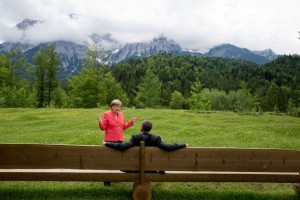
President Barack Obama talks with German Chancellor Angela Merkel at the G7 Summit at Schloss Elmau in Bavaria, Germany, June 8, 2015. (Official White House Photo by Pete Souza)
Wales to Warsaw
The Warsaw summit is likely to be at least as important as the last one in Wales and is likely to have even more far-reaching consequences. We find troubling – if not surprising – NATO Secretary General Jens Stoltenberg’s statement at a pre-summit press event on July 4 that NATO members will agree to “further enhance NATOs military presence in the eastern part of the alliance,” adding that the alliance will see its “biggest reinforcement since the Cold War.”
The likelihood of a military clash in the air or at sea – accidental or intentional – has grown sharply, the more so since, as we explain below, President Obama’s control over top U.S./NATO generals, some of whom like to play cowboy, is tenuous. Accordingly we encourage you, as we did before the last NATO summit, to urge your NATO colleagues to bring a “degree of judicious skepticism” to the table at Warsaw – especially with regard to the perceived threat from Russia.
Many of us have spent decades studying Moscow’s foreign policy. We shake our heads in disbelief when we see Western leaders seemingly oblivious to what it means to the Russians to witness exercises on a scale not seen since Hitler’s armies launched “Unternehmen Barbarossa” 75 years ago, leaving 25 million Soviet citizens dead. In our view, it is irresponsibly foolish to believe that Russian President Vladimir Putin will not take countermeasures – at a time and place of his own choosing.
Putin does not have the option of trying to reassure his generals that what they hear and see from NATO is mere rhetoric and posturing. He is already facing increased pressure to react in an unmistakably forceful way. In sum, Russia is bound to react strongly to what it regards as the unwarranted provocation of large military exercises along its western borders, including in Ukraine.
Before things get still worse, seasoned NATO leaders need to demonstrate a clear preference for statesmanship and give-and-take diplomacy over saber-rattling. Otherwise, some kind of military clash with Russia is likely, with the ever-present danger of escalation to a nuclear exchange.
Extremely worrisome is the fact that many second-generation NATO leaders seem blithely unaware – or even dismissive – of that looming possibility. Demagoguery like that coming from former Polish President Lech Walesa, who brags that he would “shoot” at Russian jets that buzz U.S. destroyers assuredly are not at all helpful. Walesa’s tone, however, does reflect the macho attitude prevailing today in Poland and some other NATO newcomers.
We believe Foreign Minister Frank-Walter Steinmeier was correct to point out that military posturing on Russia’s borders will bring less regional security. We applaud his admonition that, “We are well advised not to create pretexts to renew an old confrontation.”
A Need For Candor
Speaking of “pretexts to renew an old confrontation,” we believe the time has come to acknowledge that the marked increase in East-West tensions over the past two years originally stemmed from the Western-sponsored coup d’état in Kiev on Feb. 22, 2014, and Russia’s reaction in annexing Crimea.
Although we have a cumulative total of hundreds of years of experience in intelligence, we had never before seen planning for a
coup d’état exposed weeks in advance – and then carried out anyway. Few seem to remember that in early February 2014, YouTube published
a recording of an intercepted conversation between U.S. Assistant Secretary of State Victoria Nuland and the U.S. ambassador in Kiev, during which “Yats” (for Arseniy Yatsenyuk) was identified as Washington’s choice to become the new prime minister of the coup government in Kiev.
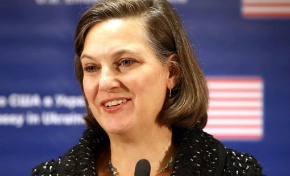
Assistant Secretary of State for European and Eurasian Affairs Victoria Nuland during a press conference at the U.S. Embassy in Kiev, Ukraine, on Feb. 7, 2014. (U.S. State Department photo)
This unique set of circumstances prompted widely respected analyst George Friedman, president of the think tank STRATFOR, to label the Putsch in Kiev on Feb. 22, 2014, “really the most blatant coup in history.”
If one listens only to Western politicians and the corporate media, however, their version of recent history in Eastern Europe begins on Feb. 23, 2014. A particularly
blatant example of this came on June 30, when U.S. Ambassador to NATO Douglas Lute spoke at a pre-summit press briefing:
“beginning in 2014 and still to this day, we’re moving into a new period in NATO’s long history. Why do I say that? Here’s the evidence I cite. So the first thing that happened in 2014 that marks this change is a newly aggressive, newly assertive Russia under Vladimir Putin. So in late February, early March of 2014, the seizing, the occupying of Crimea followed quickly by the illegal political annexation of Crimea. … Well, any notion of strategic partnership came to an abrupt halt in the first months of 2014.” (Emphasis added)
In view of the coup d’état and post-coup instability in Ukraine, what Ambassador Lute goes on to say about NATO’s professed desire for stability in Ukraine comes across as disingenuous. Far more important, it puts Russia on notice that – in the U.S. view, at least – meddling on the “periphery” between NATO and Russia will continue.
According to Lute, one of the “key themes” at Warsaw will be: “What do we do about the periphery.” Lute explains: “Here we talk about projecting stability. So we don’t have an obligation to defend states beyond NATO’s territory, but we realize it’s in our interest to make them as stable as possible.”
We suggest that it is past time for Western leaders to admit that there is not one scintilla of evidence of any Russian plan to annex Crimea before the coup in Kiev and the coup leaders began talking about Ukraine joining NATO. If senior NATO leaders continue to be unable or unwilling to distinguish between cause and effect, increasing tension is inevitable with potentially disastrous results – all of them unnecessary and avoidable, in our view.
Ukraine: Still Festering
In our August 2014 memorandum, we suggested that you be “appropriately suspicious of charges made by the U.S. State Department and NATO officials alleging a Russian invasion of Ukraine.” Actually, the gravity of the situation was considerably worse than we realized at the time.

Former NATO Commander Philip M. Breedlove.
We now know that U.S. Air Force Gen. Philip Breedlove, who was Supreme NATO Commander until two months ago, was pressing hard for confrontation with Russia and the anti-coup separatists in eastern Ukraine. This comes through clearly in Breedlove’s recently
disclosed emails, which now confirm what we believed in 2014; namely, that everyone needed to examine closely Breedlove’s exaggerated claims, many of them based on fuzzy photos and other highly dubious “intelligence.”
Lobbying for approval to wage a proxy war with Russia in Ukraine, Breedlove was highly critical of President Barack Obama’s policy, which Breedlove disparaged as simply: “Do not get me into a war.” (As though this were some kind of cowardly order!)
The emails show that behind Obama’s back, Breedlove kept trying to “leverage, cajole, convince or coerce the U.S. to react” to Russia. One of Breedlove’s email correspondents wrote back to him: “Given Obama’s instruction to you not to start a war, this may be a tough sell,” but this did not stop Breedlove from trying.
In 2015, as your own intelligence analysts were able to tell you, Breedlove went beyond hyperbole to outright fabrication with claims that “well over a thousand combat vehicles, Russian combat forces, some of the most sophisticated air defense weapons, and battalions of artillery” had been sent to eastern Ukraine.
These were the kinds of faux claims Breedlove used in attempts to enlist help from the senior military and Congress in getting Obama to supply weapons to Ukrainian armed forces.
Lest we seem to be singling out Gen. Breedlove, his predecessor as Supreme NATO Commander, Adm. James Stavridis, was hardly provided good example. A year after the U.S. led some NATO countries in a Blitz of aircraft and missile strikes against Libyan President Muammar Gaddafi, Stavridis and former U.S. Ambassador to NATO Ivo Daalder wrote in Foreign Affairs: “NATO’s operation in Libya has rightly been hailed as a model intervention.”
The operation was just the opposite, of course. The chaos now reigning in Libya, with hundreds of refugees drowning in the Mediterranean, offers abundant proof that your government’s decision to keep Germany at arms-length from that “model intervention” was a wise one.
While it is somewhat awkward for us to offer such candid comments on the character and caliber of the most senior U.S. generals and admirals – including those, like Ambassador Lute, who end up getting appointed to senior political positions at NATO – such a critique is unavoidable. The important reality to which we draw your attention pertains not only to their qualifications, but also to their dismissive attitude toward President Obama.
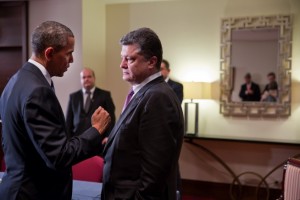
President Barack Obama and President Petro Poroshenko of Ukraine talk after statements to the press following their bilateral meeting at the Warsaw Marriott Hotel in Warsaw, Poland, June 4, 2014. (Official White House Photo by Pete Souza)
We observed in our Aug. 30, 2014 memorandum that President Obama “has only tenuous control over the policymakers in his administration.” That this includes senior military leaders can be seen in Obama’s failure to remove Gen. Breedlove, who – in addition to his intense maneuvering behind Obama’s back – made little effort to hide his open disdain for the cautious approach of his commander in chief toward the possibility of armed confrontation in volatile places like Ukraine.
An Appropriate “Nein!”
One factor encouraging us to write to you again is your proven record of insistence on tenacious diplomacy rather than saber rattling and provocation. We noted, for example, that at a press conference with President Obama in Washington on Feb. 9, 2015, you personally experienced Breedlove-type pressure for sending lethal weaponry to Ukraine – the kind of pressure still being applied to Obama himself. You stuck to your guns, so to speak, when the first designated questioner noted that the U.S. was considering providing lethal weapons to Ukraine and that your view was “very different.”
“I have given you my opinion on the export of arms,” was your unequivocal answer. Nor did you diverge from your insistent preference for diplomacy over arms, as you replied to a final, plaintive question: “Mrs. Merkel, … diplomacy, as you said yourself, has not brought much progress. Can you understand the impatience of the Americans when they say we ought to now deliver weapons?”
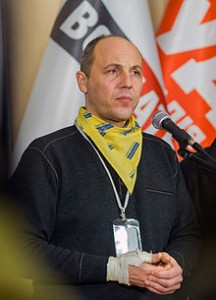
Right-wing Ukrainian politician Andriy Parubiy.
We believe your resolute “nein” to providing weapons to Ukraine was a key factor in scuttling that ill-conceived idea last year. And, as you know far better than we, your clearly expressed stance helped bring about a ceasefire that, however imperfect, was infinitely better than the escalation of fighting that would have inevitably resulted from sending weapons to Kiev’s government forces.
You stuck to your position, even though it put you in opposition to nearly all political, military, and media voices in the U.S., which were expressing disdain for diplomacy and preference instead for war.
It is inevitable that there will be more proposals to send weapons to the Kiev government, particularly in view of the continued hostilities in eastern Ukraine. We hope that unbiased scrutiny can be given to which parties are responsible for blocking full implementation of the Minsk accords that you, Foreign Minister Steinmeier, and your French and Russian counterparts have worked hard to offer as a plan for peace in Ukraine.
Secretary of State John Kerry is visiting Kiev on July 7, a day before the Warsaw summit opens. He might be asked to share his impressions on the stormy political events in Ukraine over the past few months.
In our view, things have gone from bad to worse there, with Andriy Parubiy now speaker of the Ukrainian parliament. Parubiy is one of the most conspicuous leaders of Ukrainian ultra-nationalist, and outright neo-Nazi, movements. In 1991 he founded the Social-National Party of Ukraine, together with Oleh Tyahnybok, another February 2014 coup plotter, who now leads the extreme right Svoboda party.
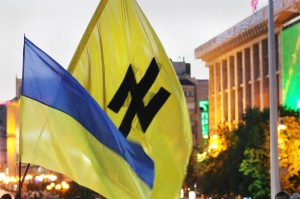
The neo-Nazi Wolfsangel symbol on a banner in Ukraine.
The name of Parubiy’s Social-National Party was chosen to identify it with Hitler’s National Socialist Party. Its official symbol is the somewhat modified Wolf’s Hook (Wolfsangel), used by the SS. Both parties blame Russia for the ills besetting Ukraine.
Parubiy as Parliament Speaker makes a mockery of NATO Secretary General Stoltenberg’s insistence that NATO has resolved to make sure that a law-abiding Kiev is “committed to democracy.”
On Monday, Parubiy stated on TV, “I have not supported the Minsk agreements from the very start,” adding that Moscow’s “plans on Ukraine may be stopped only by force and international sanctions.”
Also on Monday, Kremlin spokesman Dmitry Peskov told reporters that Ukraine has not made any new effort to facilitate implementation of the Minsk accords that call for a ceasefire, weapons withdrawal, local elections in eastern Ukraine, and constitutional reform.
Doing the Possible in Poland
Instead of muscle flexing and saber rattling, it would likely be more constructive if NATO leaders held a serious discussion regarding Kiev’s recalcitrance on the Minsk accords. An open discussion would mean avoiding the usual knee-jerk, wholesale identification with Ukraine’s long list of real and imagined grievances against Russia.
U.S. Ambassador Lute might be asked if knows anyone with the kind of influence with Kiev that it would take to break the logjam and move events toward implementation of the peace agreements so painstakingly worked out at Minsk.
Another worthwhile endeavor would be to establish a NATO working group to respond to Russia’s suggestion to devise organizational and technical measures to prevent close encounters or clashes of aircraft over the Baltic Sea.
Lastly, it would be highly constructive if NATO would take responsibility for assessing the fundamental factors behind the hideous outbreak of the terrorist acts that took so many lives over recent days in Istanbul, Dhaka, Bangladesh, and Baghdad. In this context, as well as in central Europe, violence begets violence. It should not be beyond the capability of NATO to undertake a fresh, hard look at why terrorism continues to increase, and to attempt to come up with new, more imaginative, less violent ways to address the issues that ultimately fuel the curse of terrorism.
NOTE: As is our custom, we are sending the White House a copy of this memorandum. We would like you to know, however, that we rarely receive any acknowledgement that our memoranda get through to President Obama – or that the he pays them any heed if they do reach his desk. We suspect that the wide generation gap between his relatively young advisers and the longtime collective experience that we in VIPS bring to the table may, in part, account for this. Therefore, if you find our thoughts informative – perhaps even provocative – we suggest that, when you see the President on Friday in Warsaw, you urge the President to obtain and read his copy.
For the Steering Group of Veteran Intelligence Professionals for Sanity
William Binney, former Technical Director, NSA; co-founder, SIGINT Automation Research Center (ret.)
Daniel Ellsberg, former State Department and Defense Department Official (VIPS Associate)
Graham E. Fuller, Vice-Chair, National Intelligence Council (ret.)
Philip Giraldi, CIA, Operations Officer (ret.)
Mike Gravel, former special agent of the Counter Intelligence Corps. former United States Senator from Alaska
Matthew Hoh, former Capt., USMC, Iraq & Foreign Service Officer, Afghanistan (associate VIPS)
Larry C Johnson, CIA & State Department (ret.)
Brady Kiesling, Foreign Service Officer, Political Counselor, Embassy Athens, (ret.) (associate VIPS)
John Kiriakou, Former CIA Counterterrorism Officer
Edward Loomis, NSA Cryptologic Computer Scientist (ret.)
David MacMichael, National Intelligence Council (ret.)
Ray McGovern, former US Army infantry/intelligence officer & CIA analyst (ret.)
Elizabeth Murray, Deputy National Intelligence Officer for Middle East, CIA (ret.)
Torin Nelson, Former HUMINT Officer, U.S. Department of the Army
Todd Pierce, MAJ, US Army Judge Advocate (ret.)
Scott Ritter, former Maj., USMC, former UN Weapon Inspector, Iraq
Coleen Rowley, Division Counsel & Special Agent, FBI (ret.)
Peter Van Buren, U.S. Department of State, Foreign Service Officer (ret.) (associate VIPS)








